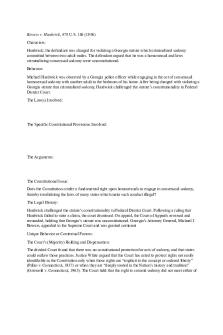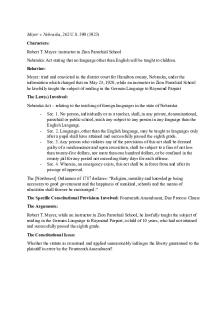Hamilton v Nuroof - case notes PDF

| Title | Hamilton v Nuroof - case notes |
|---|---|
| Course | Torts |
| Institution | University of Technology Sydney |
| Pages | 4 |
| File Size | 96.2 KB |
| File Type | |
| Total Downloads | 33 |
| Total Views | 136 |
Summary
case notes...
Description
Hamilton v Nuroof (WA) Pty Ltd (1956) 96 CLR 18 The defendants were contracted to repair flat roofs on top of a sixstorey building They engaged the plaintiff as a labourer While passing a bucket of molten bitumen to the leading hand, he tipped it over himself and sustained severe injuries The trial judge found for the defendant; the plaintiff appealed HC said it appeared that the accident arose out of the method used by the employer There could have been safer methods to raise the bitumen Held that the degree of injury likely would be grave, the risk was real and not fanciful, was no risk by taking an alternative method Court said: “We think that the plaintiff’s injuries were attributable to a failure in the fulfillment of the defendant’s duty of care for the plaintiff’s safety. Appeal was allowed Waller v James [2002] NSWSC 462 Wrongful life action where the plaintiff was born with cerebral thrombosis Supreme court found the plaintiff could not recover, but held that there was a duty of care owed to the plaintiff during the IVF treatment of her mother The defendants owed the ex utero unborn child a duty of care during the treatment of her mother, but that this duty of care was limited in content to a duty not to injure the child before or during the pregnancy. It did not extend to advising the child’s parents of the possibility of termination of pregnancy to prevent the child’s birth.
Hedley Byrne & Co Ltd v Heller & Partners Ltd [1964] AC 465 o Before Hedley, there could be no recovery in the case of financial loss caused by a negligent misstatement. o House of Lords recognised that the making of a negligent misstatement causing economic loss in limited circumstances would give rise a duty of care o In this case though, court actually found for the defendant because of a disclaimer of liability made by defendant. Facts: o Defendants were a bank who had provided a credit reference for a company which was one of the bank’s clients. The reference was given to the plaintiffs, who were a firm of advertising agents who extended credit to the company on the strength of the credit reference. But the company was in financial difficulty and went into liquidation, leaving debt to plaintiff unpaid o Plaintiff sued the bank claiming they should’ve known the company’s financial woes, credit reference was given negligently. o Duty will not arise unless the defendant gives out information knowing that it will be relied upon by the plaintiff and unless it is reasonable in the circumstances for the plaintiff to rely on the information. o Skill and judgment of the person making statement, and nature of reliance by the plaintiff are relevant. Shaddock v Parramatta City Council (No 1) (1981) 150 CLR 225 o Property developers had purchased property within the Parramatta area and their solicitor made a telephone and written inquiry asking the council whether the property was affected by road widening proposals. The council did not disclose that it was. It was the usual practice of council to disclose this. o The property was subject of road widening plans by council and plaintiffs claimed they suffered financial loss as a result of the council’s failure to disclose the information o The HC found that the council owed a duty of care to take reasonable care in the giving of information, the council was the only place the information could have come from, they had also requested the information o In Australia: it is not a prerequisite to the duty of care that the
defendant be ‘in the business’ of giving information or advice. It will be relevant though to the question of whether or not it was reasonable for the plaintiff to rely on the information or advice given by the defendant Shaddock v Parramatta City Council (No 1) (1981) 150 CLR 225 Facts: The plaintiff wanted to purchase a house. The plaintiff’s solicitors approached the council and made phone and written inquiries about whether there were road widening proposals. Council issued a certificate which indicated property was not subject to any road widening proposals. The property was in fact subject to road widening proposals. The plaintiff claimed that they suffered financial loss due to the defendant’s failure to disclose information Judgement: The council owed DOC in giving information in answering written inquiry Giving information is subject to same legal standards as advice – info and advice given had the same status and treated the same way in this respect Circumstances in which info given is relevant to reliance – reasonable reliance by the plaintiff is crucial The plaintiff requested information and the defendant knew the plaintiff would rely on it and for what purpose The defendant was the only person in possession of this info Hawkins v Clayton (1988) 164 CLR 539 o Defendant were firm of solicitors, prepared a will and kept in custody for their client who died o Plaintiff was executor and residuary beneficiary of the will. Solicitors failed to notify the plaintiff of existence of the will even though they could have found them o Principal asset of the estate, the house, fell into disrepair over 6 years o When plaintiff was eventually informed, there was a substantial death duty penalty and economic losses o HC imposed duty of care – reliance, proximity, assumption of responsibility...
Similar Free PDFs

Hamilton v Nuroof - case notes
- 4 Pages

Harris v. Balk - Case Notes
- 2 Pages

Hanna v. Plumer - Case Notes
- 3 Pages

Jones v Padavatton - case notes
- 1 Pages

R V Hutty case notes
- 5 Pages

TEST DE HAMILTON
- 1 Pages

Hamilton&Jefferson
- 2 Pages

Royall v The Queen case notes
- 41 Pages
Popular Institutions
- Tinajero National High School - Annex
- Politeknik Caltex Riau
- Yokohama City University
- SGT University
- University of Al-Qadisiyah
- Divine Word College of Vigan
- Techniek College Rotterdam
- Universidade de Santiago
- Universiti Teknologi MARA Cawangan Johor Kampus Pasir Gudang
- Poltekkes Kemenkes Yogyakarta
- Baguio City National High School
- Colegio san marcos
- preparatoria uno
- Centro de Bachillerato Tecnológico Industrial y de Servicios No. 107
- Dalian Maritime University
- Quang Trung Secondary School
- Colegio Tecnológico en Informática
- Corporación Regional de Educación Superior
- Grupo CEDVA
- Dar Al Uloom University
- Centro de Estudios Preuniversitarios de la Universidad Nacional de Ingeniería
- 上智大学
- Aakash International School, Nuna Majara
- San Felipe Neri Catholic School
- Kang Chiao International School - New Taipei City
- Misamis Occidental National High School
- Institución Educativa Escuela Normal Juan Ladrilleros
- Kolehiyo ng Pantukan
- Batanes State College
- Instituto Continental
- Sekolah Menengah Kejuruan Kesehatan Kaltara (Tarakan)
- Colegio de La Inmaculada Concepcion - Cebu







